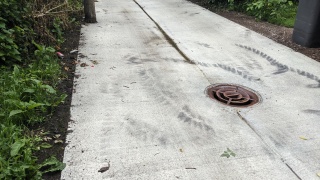I suppose it would be appropriate now to review my impression of this year's retreat. I found things both pleasing and worrying about it.
It will continue.
NoLAR is modeled on the
Autreat experience. Attendees to any event will find things to complain about, of course, but the only complaint that I found legitimate about Autreat is that it is primarily the product of a single person. If anything happened to that one person, then Autreat might fail to return. A few people last year (and this year) referred to NoLAR as "Terry's event". I wanted to make sure that it could survive without me, so I withdrew more than necessary to let others "sink or swim" in their efforts to keep the conference on schedule. It worked. I'm very pleased to report that it is not my event. It can survive without me. NoLAR is a phenomenon with a momentum of its own. There will be more of these retreats in the future. That's good. That's very good.
It provides new perspective. We had attendees that ranged in age from 20s to 60s. We had people diagnosed late in life and very early in life. One young man explained that his attendance this year would not have been possible just 8 years ago without all of the lessons and continuing support that he had learned during specialist care during his early years. I think that those of us (me included) who were "thrown to the dogs" in our 20s and learned to cope (even if barely) while alone were able to see the value of gaining survival skills at a much earlier age through tutelage instead of trial-and-error.
It will provide social growth. I
mentioned earlier that I hoped the retreat would avoid becoming edutainment. Since it focuses on being just a local event, I keep hoping that it will encourage people to support each other in practical endeavors locally. That didn't happen much this time. Or... at least, not by my definition. Being mostly the talkative crowd, the attendees seemed to enjoy each other's company and they plan to maintain contact after the conference. That's a very significant outcome, considering the audience. It's progress worth celebrating.
One of the quiet loners (who avoided most of the sessions and events) approached me to try to keep in touch after the retreat. I don't do phone conversations, unfortunately, and he doesn't have email access. I decided to write him a note with my mailing address so he has the option of contacting me that way if he wants. Baby steps. It's a big world out there.
It will be weird. The evil dragon of otherness raised its head again. I need to find a way to remind all of us in these situations that NTs (neurotypicals ("normals")) are not all evil just because they tend to have a better understanding of lies and deception than we do. Just because they understand it does not mean that they practice it. It's difficult, though, to overcome hard lessons learned in actual experience. Some stereotypes are appropriate when they're based in real personal experience, but we need fewer barriers, not more barriers, to useful communication.
Phrases spoken too loudly or with the wrong prosody will cause distress. A few minor disturbances (but no major ones, thankfully) appeared because of words spoken harshly. Nothing that interrupted the flow of the conference though. And we're not as skilled at pleasant teasing as we want to be.
Then there was the weirdness at the last hour while waiting to take a group photograph before we left for the bus. Some folk started choosing categories as summaries of the event. One man had the best clothes, another the best physique, and I was voted to have the best hair... which quickly devolved into my being voted the sexiest attendee. Very uncomfortable and weird. They were having fun with their categories, though, and that's a common autistic "thing"... trying to classify experiences. It can easily be inappropriate though when it's actual living people (who are standing right there with you) that are being classified.
It will change. What worries me though is that with a distributed organizational structure, NoLAR's purpose and execution will change. That can be good or bad, of course, but I'm worried about a particular change that seems inevitable. It's something that I've noticed in the monthly support group over the last 5 years: the group changes to favor the kinds of interactions that the "talkative autistics" prefer.
I realized at NoLAR that I was gravitating to sitting either alone or next to the other "quiet autistics". There were 1 or 2 who spoke less than I did. We tended to sit by each other. I realized that I do the same at the support group meetings. There's one man who's attended those meetings as long as I have (over 5 years) and I've never heard him speak anything other than his name, "No", or "I pass" when his turn came to speak. I realized at NoLAR that he and I tend to sit next to each other too. I don't remember if it's me seeking him or him seeking me. I'll try to notice in future meetings.
The final session of the event was a kind of brainstorm session about future retreats. The conference that they want is the edutainment variety, with paid speakers and multiple concurrent sessions and more group social events (like this year's pontoon ride on the lake). Definitely not what I was hoping for. If it's useful to them, then I intend to continue helping produce the conference, but I still worry that the quiet folk will slowly self-select themselves out of participation like happens with the support group.
I was hoping to maintain the Autreat-style quiet-time retreat, but it looks like that won't happen without keeping a single person in control of the event. Opening things up to group control (which I usually approve) favors a slow but inevitable creep towards "talkative" standards. I need to ponder how best to maintain a "quiet autistic" aspect to the retreat so that all kinds of folk will continue to find it welcoming.








